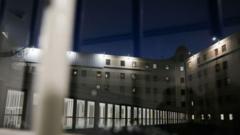French Justice Minister Gérald Darmanin announced plans for a €400m high-security prison in the Amazon, intended to incapacitate drug lords and radical extremists. The facility responds to escalating criminal violence and aims to sever connections between inmates and their networks.
France to Establish High-Security Prison in Amazon Rainforest

France to Establish High-Security Prison in Amazon Rainforest
A new prison in French Guiana aims to combat organized crime, including drug trafficking, amidst rising violence linked to gangs.
France is set to construct a high-security prison in French Guiana, a French overseas territory located in South America, aimed specifically at addressing organized crime such as drug trafficking and housing radical Islamist prisoners. This ambitious plan was revealed by Justice Minister Gérald Darmanin during his recent visit to the region, during which he emphasized the prison's focus on disrupting the entire drug supply chain.
The facility, budgeted at €400 million (£337 million), is expected to accommodate up to 500 inmates and may open as soon as 2028. It will be situated in the remote Amazonian terrain of Saint-Laurent-du-Maroni, a location far removed from urban centers, which, according to Darmanin, will hinder criminal leaders' ability to communicate with their networks back home. The minister declared that the prison will be managed under "an extremely strict carceral regime," targeting the most dangerous criminals, particularly those involved in narcotics trafficking.
The announcement comes in the wake of recent events marked by violent disruptions linked to criminal gangs, which have threatened prisons and personnel across France. In an interview with Le Journal du Dimanche (JDD), Darmanin noted that positioning the prison in this isolated setting would serve as a "lasting means of removing the heads of drug trafficking networks" from mainland France.
As France wrestles with the consistent infiltration of mobile phones into its prisons—thousands of which are reported to circulate—policing these connections has proven challenging. Earlier this year, the government introduced new legislative measures targeting criminal organizations, including a dedicated prosecution branch for organized crime. Alongside these efforts, the establishment of new high-security facilities aims to impose stricter visitation and communication policies to mitigate the influence of incarcerated criminals.
Recent months have witnessed a surge of attacks on prisons, termed "terrorist" incidents by Darmanin, reflecting a backlash against the government’s intensified crackdown on organized crime. Perpetrators have utilized burning vehicles and gunfire against prison facilities, presenting themselves as champions of prisoner rights.
The proposed prison location is historically significant, once serving as the access point to the notorious Devil's Island penal colony which housed 70,000 convicts between the mid-19th and mid-20th centuries. This penal history adds an additional layer of complexity to the current state of France's penal system in its ongoing battle against organized crime.


















